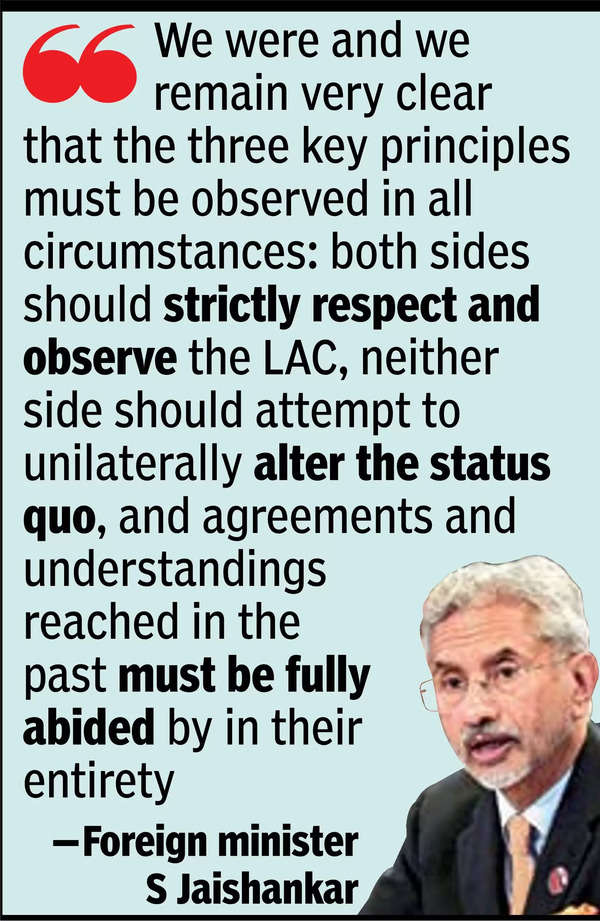NEW DELHI: Disengagement with China in eastern Ladakh, including at the remaining and contentious friction points of Depsang and Demchok, has been fully achieved through a step-by-step process, setting Sino-Indian ties in the direction of “some improvement”, said foreign minister S Jaishankar in Lok Sabha on Tuesday as he briefed MPs about the Oct 21 agreement with China that has sparked hope of a rapprochement in bilateral relations.
The minister, who has stressed in the past that aggressive deployment and not land grab was the problem in the stand-off, said India will now prioritise de-escalation – to address the amassing of troops along the LAC – and effective management of activities in the border areas. He also said that the disengagement allows India to consider other aspects of engagement in a calibrated manner, keeping “our national
While complimenting the defence and diplomatic wings for working in lock-step to ensure that India’s national interests were preserved, Jaishankar also acknowledged the role played by improved border infrastructure that ensured effective counter-deployment.
On the wider border issue, Jaishankar said India remains committed to engaging with China to reach a fair, reasonable and mutually acceptable framework for a boundary settlement.
On India’s expectations from ties with China, the minister said that govt is clear that maintenance of peace and tranquillity in the border areas is a prerequisite for development of ties. “In all of this, we were and we remain very clear that the three key principles must be observed in all circumstances: both sides should strictly respect and observe the LAC, neither side should attempt to unilaterally alter the status quo, and agreements and understandings reached in the past must be fully abided by in their entirety,” he said.
On the Oct 21 understanding, the minister said India’s objective was to ensure patrolling, as in the past, to the relevant points, as well as resumption of access to grazing grounds by Indian civilians as per the long-standing practice. “This is indeed what we have agreed upon in regard to Depsang and Demchok,” he said.

While concerns have been raised about buffer zones that were created to defuse the situation, Jaishankar said in a few other places where friction occurred in 2020, steps of a temporary and limited nature were worked out, based on local conditions, to obviate the possibility of further friction. “This, I must stress, applies to both sides and can be revisited as the situation demands. In that sense, our stance has been resolute and firm and serves our national interest fully,” he said.
“The combination of a firm and principled stance on the situation in the border areas as well as our clearly articulated approach to the totality of our ties have been the foundation of our engagement with China for the last four years,” added the minister.
According to Jaishankar, the situation in Depsang and Demchok pertained primarily to obstructions of long-standing Indian patrolling activity but in Demchok, there was also the question of access for nomadic Indian population to traditional grazing grounds, as well as to sites of significance to the local people.
“As a result of this recent understanding arrived at after intensive negotiations, resumption of patrolling to the traditional areas is under way. It was initially tested by sending out patrols for verification of disengagement on the ground and is being followed up by regular activities as per the agreed understanding,” said the minister.
“The ensuring of our national security in this manner is the result of cumulative and coordinated endeavours of many parts of the govt, obviously centred around our defence and security forces. The competence and professionalism of our services in this period was displayed in our speedy and effective counter-deployment,” he added.
